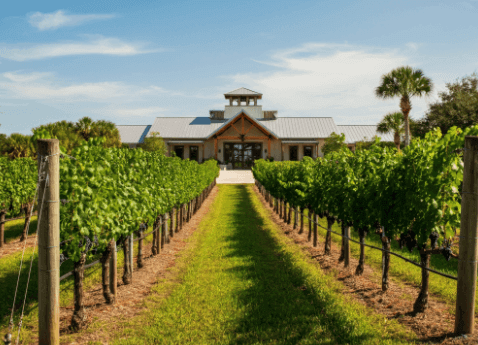Are you thinking about venturing into the world of vineyards or wineries? Whether you’re a land buyer, real estate investor, property buyer, or a land developer, buying land for vineyards or wineries in Florida can be fruitful. Florida’s unique climate offers a distinct advantage for grape cultivation, making it the best location for vineyards or wineries. This guide will explore everything you need to know about buying land for vineyards or wineries in Florida.
When buying land for vineyards or wineries in Florida, considering the experience of seasoned investors like Steve Daria and Joleigh can be invaluable. They stress the importance of analyzing soil quality and climate conditions to ensure the land is suitable for grape cultivation. Additionally, Steve and Joleigh recommend thorough research on zoning laws and water rights to avoid future regulatory issues.
Understanding the Vineyard and Winery Business
Before you start looking and buying land for vineyards or wineries in Florida, it’s essential to understand the business.
Both vineyards and wineries have unique requirements and processes.

Vineyard
The cultivation of grapevines is the central activity in a vineyard, with careful attention paid to factors such as soil composition, climate, and grape variety selection.
The quality of the grapes harvested from the vineyard directly influences the wine’s character and flavor profile.
Vineyard management practices, including pruning, irrigation, and pest control, are meticulously executed to ensure optimal grape health and ripeness, ultimately contributing to the success and reputation of the vineyard.
Winery
Unlike a vineyard, a winery encompasses all stages of wine production, from grape processing and fermentation to aging, blending, and bottling.
Wineries serve as the hub where harvested grapes are transformed into wine through various processes, including crushing, pressing, fermentation, and barrel aging.
Winemakers play a critical role in overseeing these operations, employing their expertise to craft wines that express the unique characteristics of the grape varieties and the terroir from which they originate.
Get Started: Get Your Cash Offer Below…
We are direct land buyers. There are no commissions or fees and no obligation whatsoever. Start below by sharing where your property is and where we can send your offer…
Considerations when Buying Land for Vineyards or Wineries in Florida
This section provides insights into the important factors to evaluate when selecting land for vineyards or wineries in Florida.
Climate and Soil Conditions
Florida’s climate is generally warm and humid, which can be both an advantage and a challenge for grape growing.
Certain grape varieties thrive in these conditions, while others may struggle.
- Muscadine Grapes: Muscadine grapes thrive in Florida’s warm and humid climate, making them an excellent choice for vineyard cultivation in the state. Known for their resilience to pests, diseases, and extreme weather conditions, muscadine grapes are ideally suited to Florida’s subtropical environment.
- Hybrid Grapes: Hybrid grape varieties have been specifically developed to flourish in Florida’s challenging climatic conditions, combining the best traits of both European and American grape species. Blanc Du Bois and Lomanto are two hybrid grape varieties that have gained popularity among vineyard owners in Florida for their ability to thrive in the state’s hot and humid climate.
Soil Type
The soil type is equally important. Sandy soils with good drainage are best for grapevines.
Conduct soil tests to ensure the land is suitable for grape cultivation.
Land Size and Topography
The size of the land you need will depend on your business goals.
A small boutique vineyard might require just a few acres, while a commercial operation requires considerably more.
The topography should allow for good drainage and airflow, which is crucial for healthy grapevines.
Water Availability
Grapevines require a consistent water supply, especially during the growing season.
Ensure the land has access to a reliable water source, whether an existing well, pond, or municipal water supply.
Financial and Legal Considerations
Understanding the financial and legal aspects is crucial when purchasing land for vineyards or wineries in Florida to ensure a seamless and compliant acquisition process.
Budget and Financing
Purchasing land for vineyards or wineries is a significant investment.
Develop a detailed budget that includes land acquisition, planting, equipment, and infrastructure costs.
Explore financing options such as agricultural loans, grants, and partnerships.
Zoning and Permits
Check the zoning regulations for the land you’re interested in.
Some areas may restrict agricultural activities or the construction of winery facilities.
Obtain all necessary permits and licenses before making a purchase.
Insurance and Liability
Protect your investment with appropriate insurance coverage, including liability, crop, and property insurance.
Consult with an insurance agent experienced in agricultural businesses to ensure comprehensive coverage.
Steps to Establishing Your Vineyard or Winery
This section outlines the essential steps to help you successfully set up your vineyard or winery in Florida.
Conduct a Feasibility Study
Assess the viability of your vineyard or winery project.
This includes market research, cost analysis, and risk assessment.
Identify the potential return on investment and identify any challenges you may face.
Develop a Business Plan
A planned business plan is crucial for securing financing and guiding your operations.
Outline your business goals, target market, marketing strategy, and financial projections.
Select Your Grape Varieties
Choose grape varieties well-suited to Florida’s climate and soil conditions—possible factors such as disease resistance, yield, and market demand.
Prepare the Land
Prepare the land for planting by clearing land, testing and amending the soil, and installing irrigation systems.
Proper land preparation sets the foundation for successful grape cultivation.
Plant and Maintain Your Vineyard
Plant your grapevines according to best spacing, trellising, and training practices.
Regularly monitor and maintain your vineyard by pruning, fertilizing, and controlling pests and diseases.

Build Your Winery Facilities
If you plan to produce wine, construct your winery facilities, including crushing and fermentation areas, storage, and tasting rooms.
Ensure compliance with health and safety regulations.
Frequently Asked Questions
This section addresses common queries and concerns prospective buyers may have when purchasing land for vineyards or wineries in Florida.
What are the initial costs associated with starting a vineyard or winery?
Initial costs include land acquisition, soil preparation, planting, irrigation systems, equipment, and infrastructure.
Depending on the scale of your operation, the total investment can vary widely.
How long does it take for grapevines to produce fruit?
Grapevines typically take 3 to 4 years to produce their first harvestable fruit.
Total production usually occurs around 5 to 7 years after planting.
Can I grow organic grapes in Florida?
Yes, it is possible to grow organic grapes in Florida.
However, it requires careful management of pests and diseases without synthetic chemicals.
Organic certification involves strict guidelines and regular inspections.
Conclusion
Buying land for vineyards or wineries in Florida is an exciting and rewarding venture. Understanding the unique challenges and opportunities allows you to make informed decisions and set your business up for success. From selecting the suitable land and grape varieties to navigating financial and legal considerations, every step is crucial.
**NOTICE: Please note that the content presented in this post is intended solely for informational and educational purposes. It should not be construed as legal or financial advice or relied upon as a replacement for consultation with a qualified attorney or CPA. For specific guidance on legal or financial matters, readers are encouraged to seek professional assistance from an attorney, CPA, or other appropriate professional regarding the subject matter.
